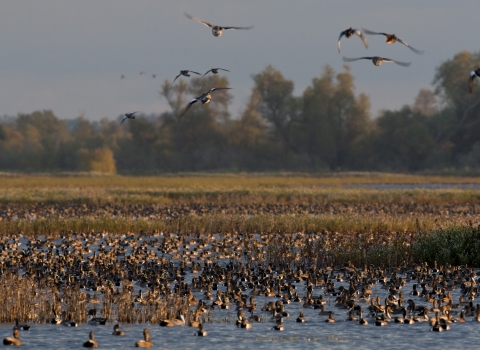The U.S. Fish and Wildlife Service is awarding more than $5.9 million to federally recognized Native American and Alaska Native Tribes through its Tribal Wildlife Grants Program to benefit fish and wildlife resources and their habitats. Nearly a quarter of those funds will support Alaska projects focused on salmon, moose, seabirds, blue mussels, and invasive species invasive species
An invasive species is any plant or animal that has spread or been introduced into a new area where they are, or could, cause harm to the environment, economy, or human, animal, or plant health. Their unwelcome presence can destroy ecosystems and cost millions of dollars.
Learn more about invasive species .
Chickaloon Native Village is receiving funds to better understand salmon runs and water quality in Moose Creek and other tributaries of the Matanuska River and build program capacity for additional fisheries projects in the future.
Tyonek Tribal Conservation District will put funds towards ongoing efforts including continuing to identify priority habitats, as well as establish baseline monitoring on systems important to Chinook Salmon.
The Native Village of Eklutna will use the funds to continue river assessment work in the upper sections of the Eklutna River including defining and evaluating spawning bed potential, better understanding water inputs, and collecting information about salmon.
The Aleut Community of St. Paul Island will study the migration timing and nonbreeding, at-sea distribution of two culturally and ecologically important seabirds (black-legged kittiwakes and thick-billed murres) that nest on St. Paul Island.
The Qawalangin Tribe of Unalaska will develop a restoration plan and pilot study for blue mussel habitat in Unalaska Bay to increase cultural and tribal subsistence food security, reduce paralytic shellfish poisoning in wildlife and people, and implement a nature-based technique for improving water quality and aquatic ecosystem health.
Central Council Tlingit & Haida Indian Tribes of Alaska is seeking to obtain an accurate scope of the invasive and recolonizing species on Native allotment lands, create an Invasive Species on Native Allotments report and management plan.
The Port Graham Village Council will conduct a moose survey, develop an alternative moose monitoring program, and incorporate traditional ecological knowledge provided by community members through focus groups.
In Alaska we are shared stewards of world renowned natural resources and our nation’s last true wild places. Our hope is that each generation has the opportunity to live with, live from, discover and enjoy the wildness of this awe-inspiring land and the people who love and depend on it.



